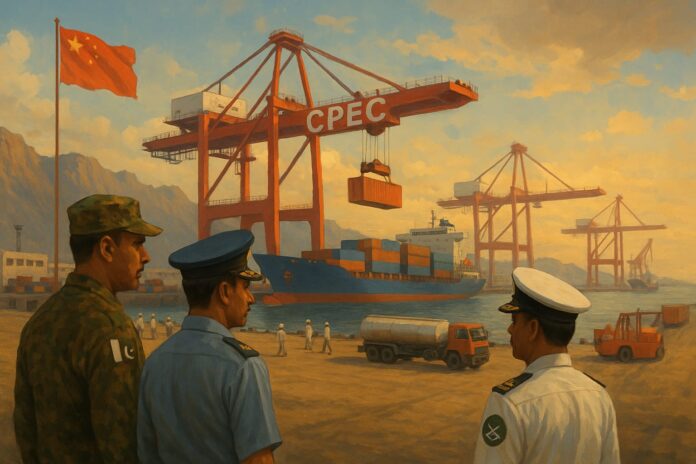China-Pakistan Economic Corridor (CPEC) has been sold as a national uplift. In practice, its structure and contracting patterns have created steady side-streams for Pakistan’s military-run foundations, Fauji (Army), Shaheen (Air Force) and Bahria (Navy), especially across Gwadar, energy, and logistics. India has formally objected to CPEC on sovereignty grounds, but the domestic political economy also merits scrutiny.
Gwadar: the logistics jackpot.
Gwadar Port is operated by China Overseas Ports Holding Company (COPHC), which also runs marine services and the free zone. COPHC itself announced appointing the Army-run National Logistics Cell (NLC) as its official road transporter in Gwadar, with plans for a trans-freight station and warehousing.
It illustrates how port operations are structured to hand reliable side-contracts to military affiliates. The Gwadar Port Authority’s own materials underscore the port’s centrality to CPEC, amplifying the value of such exclusive logistics roles.
Port and marine services: Bahria’s lane.
The Pakistan Navy’s Bahria Foundation runs Maritime Technical & Support Services (MTSS) to “assist Pakistan Navy and marine related organizations” in technical and logistics support. Pertinent to mention that it is exactly the service layer that would grow as Gwadar and related coastal activity scale.
Recent corporate announcements also show Bahria’s collaborations with international port groups on dredging and marine services, indicating expanding commercial reach alongside CPEC’s coastal build-out.
Energy: Fauji’s guaranteed returns ecosystem.
Fauji Group-linked independent power producers (IPPs) occupy meaningful space in Pakistan’s energy mix. Foundation Wind Energy I & II and FFC Energy are documented on their official sites, while Foundation Power Company Daharki signals senior ex-military leadership in generation businesses.
Although not every project sits on CPEC’s priority list, CPEC era energy policy has relied on sovereign guarantees and long-term offtake that suit incumbent IPPs, letting military foundations capture predictable cash flows as grid additions proceed.
Air logistics: Shaheen’s ground handling moat.
Shaheen Foundation’s Shaheen Airport Services (SAPS) is Pakistan’s largest ground-handling network across major airports. As CPEC-related cargo, project personnel and time-critical imports transit through air gateways, SAPS’ footprint positions the Air Force’s foundation to capture service revenues tied to corridor activity.
For India, CPEC also raises unresolved sovereignty concerns because segments run through territory under illegal Pakistani occupation. It is an official position reiterated by the Ministry of External Affairs, Government of India.
But for ordinary Pakistanis, the more immediate issue is that the supposed benefit distribution will never ever reach them. CPEC has been engineered so that high-margin logistics, marine services and energy-sector side-contracts accrue to military foundations, entrenching a commercial cabal even as promised broad-based gains remain elusive.

